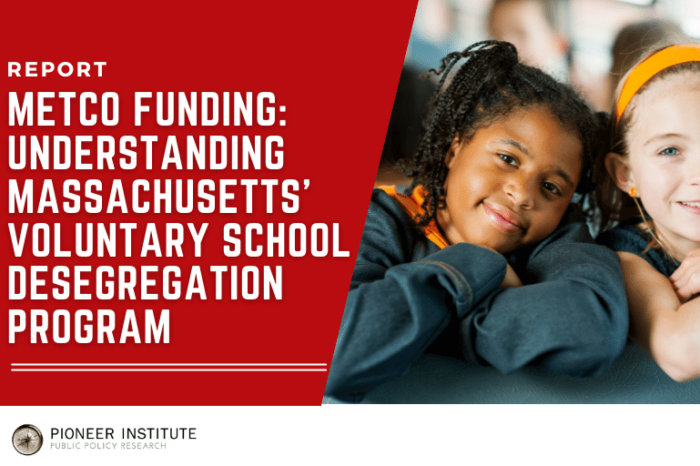METCO Works Well, Small Tweaks Could Make It Even Better, Study Says
Program should be expanded, funding simplified
BOSTON – The Metropolitan Council for Educational Opportunity, or METCO program, has successfully educated thousands of students for 56 years, but several minor changes could make it even better, according to a new study published by Pioneer Institute.
Under the program, about 3,200 mostly African-American and Hispanic students from Boston and Springfield attend public schools in about three dozen surrounding communities. METCO offers educational opportunity to families in Boston and Springfield and provides much-needed diversity to suburban school districts.
“Without METCO, diversity would be virtually nonexistent in some districts,” said Dr. Ken Ardon, the co-author of “METCO Funding: Understanding Massachusetts’ Voluntary School Desegregation Program” with Roger Hatch.
Despite accounting for just 2.5 percent of enrollment on average, METCO students account for about 40 percent of African-American students in receiving school districts. In some districts, more than two thirds of African-American students are in the METCO program.
METCO students are more likely to be African-American and to have special needs than their peers in the sending district, and less likely to be Hispanic, English language learners or economically disadvantaged.
Each year, districts decide how many students they will accept. The program is directly funded by a state grant appropriated by the legislature and indirectly funded through the state’s education funding system, known as Chapter 70.
The real value of METCO grant appropriations hasn’t fully recovered from cuts made during the Great Recession, but funding has increased in recent years. In fiscal 2021, the METCO grant was $25.6 million and averaged $7,200 per student.
METCO students are counted in receiving districts’ enrollment numbers, which means they generate more state funding for the suburban school districts. Most receive two or three thousand dollars per student above the METCO grant, but the amount varies by district due to intricacies of the Commonwealth’s education funding system.
The program has little financial impact on Boston because, as a community with greater revenue raising capacity, it gets less of its funding from the state. Since Springfield, which is less affluent, gets the bulk of its funding from the state, the city loses more state aid as a result of METCO.
Since METCO students take up unused seats in receiving districts, the marginal cost of educating them is relatively low. Nearly 60 percent of the Commonwealth’s 318 school districts participate in the state’s voluntary public school choice program. Average per-pupil funding in that program was $6,586, far less than the amount most receiving districts receive for each METCO student.
Ardon and Hatch urge simplifying the METCO grant formula by making it a straight per-pupil calculation. Currently, there are “hold harmless” provisions for districts that accept fewer METCO students. Enrollment numbers are based on a rolling three-year average and the last year taken into consideration is the previous one. These policies benefit districts with declining METCO enrollment and leave less for those that enroll more METCO students.
The authors suggest that districts could receive about 80 percent of their METCO funding before the school year, while 20 percent of it could be held back until actual enrollment numbers are determined in December.
Ardon and Hatch also call for additional state funding to support late afternoon buses that would allow METCO students to participate in extracurricular activities and cover special education costs of METCO students.
Finally, they recommend that the Commonwealth provide the additional funds needed to cover immediate costs of expanding METCO and adequate ongoing grant money to support a larger program.
“METCO has a long record of success,” Hatch said. “A relatively small investment would allow it to serve additional students and families.”
About the Authors
Ken Ardon received a Ph.D. in economics from the University of California at Santa Barbara in 1999, where he co-authored a book on school spending and student achievement. He taught economics at Pomona College before moving to Massachusetts, and from 2000 to 2004, Dr. Ardon worked for the Commonwealth of Massachusetts in the Executive Office of Administration and Finance. He is a professor of economics at Salem State University, where he has taught since 2004. Dr. Ardon is a member of Pioneer Institute’s Center for School Reform Advisory Board.
Roger Hatch spent a long career working for the Commonwealth of Massachusetts in the areas of school and municipal finance. For 20 years he was the Administrator of School Finance at the Massachusetts Department of Elementary and Secondary Education. In addition to supervising the school choice program, the office works with the Governor’s staff, the legislature, advocacy groups, local officials and the general public, to develop, calculate, and explain the Chapter 70 state aid formula.
Pioneer Institute’s mission is to develop and communicate dynamic ideas that advance prosperity and a vibrant civic life in Massachusetts and beyond. Pioneer’s vision of success is a state and nation where our people can prosper and our society thrive because we enjoy world-class options in education, healthcare, transportation and economic opportunity, and where our government is limited, accountable and transparent. Pioneer values an America where our citizenry is well-educated and willing to test our beliefs based on facts and the free exchange of ideas, and committed to liberty, personal responsibility, and free enterprise.
Get Updates on Our Education Research
Related Posts:













